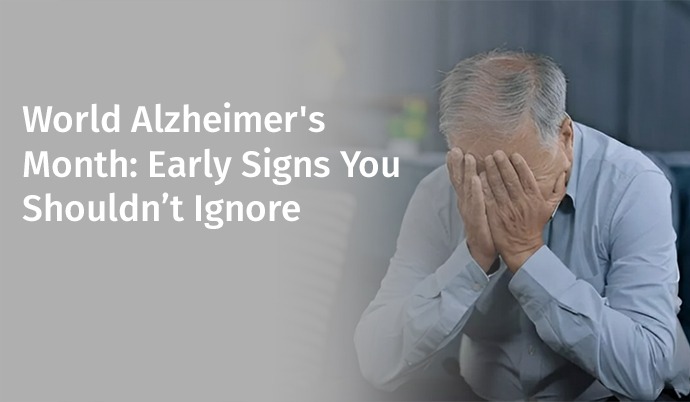This is one statistical data that may make you take a breath: over 55 million individuals worldwide are living with dementia, and experts are foreseeing that the figure will soon double in the coming 20 years. There are over 4 million dementia patients in India alone, with many of them getting to the condition only to realise it too late that they have dementia and have to live with it. The most prevalent type of dementia is that of Alzheimer which may reach up to 70% of the total count.
Though the statistics are devastating enough, Alzheimer's is more likely to sneak up on us without anyone noticing, pretending to be a part of normal ageing or an excuse to forget. This is why it is cherished so much to detect it early enough. The early signs of Alzheimer’s should be heralded as early help can be sought to slow down the course and to ameliorate the quality of life, and to ready families both emotionally and practically. Spotting Alzheimer's disease symptoms in their initial stages can help pave the path for timely Alzheimer's disease treatment.
So what about the flags to be aware of and what you can do to help your loved ones, or yourself, and be better-informed this World Alzheimer's Month?
Alzheimer’s is just Loss of Memory or More?
All of us lose track of the placement of our keys, or our brains fail to recall the name of someone at some point. That’s human. However, a consequence of memory loss causing impairments at work, home, and in social life is when red flags need to be raised. One of the early signs of Alzheimer’s is Short-term memory loss. It is one of the first and most obvious symptoms of Alzheimer's. Individuals can forget what they have just been taught, repeat the same request severally times, or even become more dependent on reminders and members of the family to do what they used to do with their own hands.
One of the most frequent mistakes is the following: it is old age. Nope. Normal ageing may imply forgetting an appointment at times and remembering it afterwards. Alzheimer's is forgetting everything, without knowing that you forgot. Following are some of the major indications that you or your loved one might be suffering from Alzheimer’s:
- Planning and Problem Solving : Alzheimer's is not only associated with memory. In the early stages of the disease, the individuals might find it difficult to do such activities as planning or number work. The process of paying household expenses, working to the recipe or remembering medicine doses may suddenly appear to be too much or too confusing. As an example, an individual formerly managing all money issues of the family may all of a sudden feel confused when having to balance a cheque book, or repeatedly fail to perform simple additions and subtractions. These are subtle early signs of Alzheimer’s that can be easily missed.
- Time and Place Confusion: Time, seasons, or dates may be forgotten by those afflicted with Alzheimer's. They can even forget the place where they are or how they arrived at a place. Picture yourself in your neighbourhood and all of a sudden you do not know where to go to get back home; such things can be frightening. It is not just simple forgetfulness but a more real cognitive disconnect. When a loved one begins to get confused about morning and night or cannot recall how he or she got somewhere, a talk is necessary. These moments often fall under the umbrella of early signs of Alzheimer’s.
- Difficulty Performing Familiar Tasks: Have you ever seen someone who knows how to use a microwave completely forget how it works and how to use it after years? Or trying to drive to a place that you know well? Alzheimer's tends to make normal activities alienating. This would usually start out stealthily but really explicitly as the days go by. Simple things such as tea-making, proper dressing according to the weather, and remote television control may become tough, and they may become frustrated or end up quitting their once-enjoyed activities. Recognising these as early signs of Alzheimer’s can make a critical difference.
- Language Difficulty and Communication Difficulties: Problems with words are another red flag. The early Alzheimer's patients may stutter in the middle of the sentence, be unable to remember the right word or use nonsense names to describe common things, such as referring to a watch as a hand clock. They can also repeat or forget the conversation. Do not ignore when you note a person getting more frustrated during speech or appears to correct himself/herself repeatedly, as it may not only be a sign of stress or tiredness. These speech difficulties are among the early signs of Alzheimer’s that families often overlook.
- Poor Judgement and Decision-Making: Alzheimer's in its early stages is capable of affecting the judgment part of the brain. This may manifest itself in some odd forms, such as wearing the wrong attire to a specific climate, spending money on strangers, or failing to consider proper personal hygiene. Individuals can be easily susceptible to fraud, or they can begin to make decisions that do not mirror themselves. One should identify these behavioural changes prior to the occurrence of dangerous outcomes. Poor judgment is one of the more subtle yet dangerous early signs of Alzheimer’s.
- Personality Shifts and Mood Changes: Alzheimer's is not only memory loss; it may transform the whole attitude of a person. Individuals may feel anxious, confused, suspicious or depressed more especially when out of their comfort zones. When a jovial relative or friend suddenly withdraws, gets angry or becomes too emotional, then there is a greater possibility that he/she is not just having a bad day. Personal changes: a more subtle but very important early alert or early sign of Alzheimer’s that something deeper may be happening is a change in personality.
- Isolating themselves in Social Activities: When an individual begins to diminish ways of associating with friends, preoccupations, or normal activities, it may be because of a loss of memory or a lack of processing of events being experienced. People may keep to themselves due to fear of embarrassment instead of seeking help. Another indication that you should pay attention to is skipping family gatherings, avoiding making or receiving phone calls, or even losing their appeal, especially in cases where the patient used to enjoy the same thing. Social withdrawal is one of the most overlooked early signs of Alzheimer’s, especially in seniors who live alone.
What Should You Do in Case You See Such Symptoms?
And a doctor, preferably a neurologist or a geriatric physician, should be met first in case you or someone you know is having these symptoms. Diagnosing the condition early is not merely useful when it comes to treatment, as it allows people and their families to plan, establish a support network, and enhance the quality of their lives. Alzheimer's cannot be cured yet, but the medicines, therapies, lifestyle changes, and other treatments reduce the rate of the disease progression and help a lot. Hence, for early diagnosis of the early signs of Alzheimer’s and proper symptom management, book an appointment at Sir Ganga Ram Hospital today.
Break the Silence Together
World Alzheimer's Month is about more than raising awareness; it is an ask to listen. Through an open conversation and awareness of the early symptoms, we can combat the stigma, be there to support others and guarantee that no one experiences dementia alone or in quiet. The reality is that Alzheimer's does not only deal with memory loss. It is that of losing chinks of identity, rather a connection, redundancy. However, through awareness and compassion, we can make the suffering individuals remember what is important: dignity, love, and some moments that are still sparkling.
So, this September, dress Purple, Speak Up and make a difference. Since keeping in mind the initial symptoms might help one not forget it too soon.





